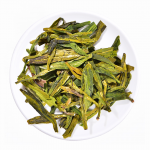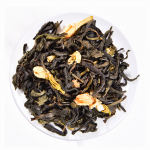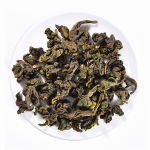Does Drinking Tea at Night Keep You Awake?

Most of the alkaloids in tea contain three parts, namely caffeine, theobromine and theophylline. These three substances are mainly composed of caffeine. Once they are absorbed by the body, they will produce obvious excitatory effects on the central nervous system and affect sleep. The green tea and oolong tea are typical examples. Green tea is non-fermented and oolong tea is semi-fermented. The content of caffeine in both is about 30mg per cup. It’s a good alternative for keeping you awake.
But not all teas are not suitable for drinking at night: black tea and Pu-erh tea are an exception. Both black tea and Pu-erh are of a higher degree of fermentation. The composition of tea polyphenols is less, and the irritation weakens after aging, as a result, the tea is very mild. It is recommended to wash Pu-erh tea more times before drinking in the evening, which will further reduce the caffeine content in the tea. A little milk can be added to black tea in drinking to warm the stomach. Good old Pu-erh is more effective in calming the nerves and promoting sleep.
Finally, however, it is not recommended for some particular consumers, who has a weak stomach, mental instability, or poor sleep quality, to drink tea at night. For normal consumers, it is best to drink mild tea at night and try to avoid strong tea. Moreover, tea is best drunk in the evening or after dinner. It is not recommended to drink tea with an empty stomach.






14 Comment(s)
Tôi cảm thấy rất thoải mái khi chơi tại FB88, họ luôn đem lại một trải nghiệm tuyệt vời.\r\nCác khuyến mãi của FB88 luôn khiến tôi cảm thấy rất hào hứng và có cơ hội nhận được nhiều phần thưởng.\r\nFB88 cung cấp các chương trình khuyến mãi rất hấp dẫn, người chơi có cơ hội nhận giải thưởng lớn.
Các chương trình khuyến mãi trên FB88 rất hấp dẫn, giúp tôi luôn cảm thấy có lợi khi tham gia.\r\nTôi rất yêu thích các trò chơi casino trực tuyến của FB88, chúng rất chân thực và thú vị.\r\nTôi rất đánh giá cao cách FB88 cập nhật các game mới liên tục, tôi luôn có thứ mới mẻ để chơi.
Tôi thích các phương thức nạp và rút tiền đa dạng mà FB88 cung cấp, rất tiện lợi.\r\nFB88 có rất nhiều trò chơi bắn cá, rất thú vị và dễ chơi.\r\nCác cược thể thao trên FB88 rất đa dạng, tôi có thể chọn cược từ nhiều môn thể thao khác nhau.
Trường Tiểu học Nguyễn Trung Trực được thành lập năm 1985 có địa chỉ tại 9A Phạm Hồng Thái, phường Nguyễn Trung Trực, quận Ba Đình, Hà Nội (Nay thành phường Trúc Bạch). Trường hoạt động dưới sự quản lý của UBND quận Ba Đình và Phòng Giáo dục và Đào tạo Ba Đình. Trường được xây dựng khang trang trên diện tích hơn 3000 m2 với đủ các phòng học và phòng chức năng cho các hoạt động học tập, vui chơi, giải trí của học sinh.\r\nĐịa chỉ: Số 9A Phạm Hồng Thái - Ba Đình - Hà Nội\r\nEmail: c1nguyentrungtruc-bd@hanoiedu.vn\r\nwebsite: https://c1nguyentrungtruc.badinh.edu.vn/\r\nĐiện thoại: 438261441
Trường Tiểu học Nguyễn Trung Trực được thành lập năm 1985 có địa chỉ tại 9A Phạm Hồng Thái, phường Nguyễn Trung Trực, quận Ba Đình, Hà Nội (Nay thành phường Trúc Bạch). Trường hoạt động dưới sự quản lý của UBND quận Ba Đình và Phòng Giáo dục và Đào tạo Ba Đình. Trường được xây dựng khang trang trên diện tích hơn 3000 m2 với đủ các phòng học và phòng chức năng cho các hoạt động học tập, vui chơi, giải trí của học sinh.\r\nĐịa chỉ: Số 9A Phạm Hồng Thái - Ba Đình - Hà Nội\r\nEmail: kumu.io@kumu.io\r\nwebsite: Https://kumu.io/NhacaiFB88betB88S/nhacaifb88betb88s#nhacaifb88betb88s\r\nĐiện thoại: 438261441
Trường Tiểu học Nguyễn Trung Trực được thành lập năm 1985 có địa chỉ tại 9A Phạm Hồng Thái, phường Nguyễn Trung Trực, quận Ba Đình, Hà Nội (Nay thành phường Trúc Bạch). Trường hoạt động dưới sự quản lý của UBND quận Ba Đình và Phòng Giáo dục và Đào tạo Ba Đình. Trường được xây dựng khang trang trên diện tích hơn 3000 m2 với đủ các phòng học và phòng chức năng cho các hoạt động học tập, vui chơi, giải trí của học sinh.\r\nĐịa chỉ: Số 9A Phạm Hồng Thái - Ba Đình - Hà Nội\r\nEmail: kumu.io@kumu.io\r\nwebsite: Https://kumu.io/NhacaiFB88betB88S/nhacaifb88betb88s#nhacaifb88betb88s\r\nĐiện thoại: 438261441
Trường Tiểu học Nguyễn Trung Trực được thành lập năm 1985 có địa chỉ tại 9A Phạm Hồng Thái, phường Nguyễn Trung Trực, quận Ba Đình, Hà Nội (Nay thành phường Trúc Bạch). Trường hoạt động dưới sự quản lý của UBND quận Ba Đình và Phòng Giáo dục và Đào tạo Ba Đình. Trường được xây dựng khang trang trên diện tích hơn 3000 m2 với đủ các phòng học và phòng chức năng cho các hoạt động học tập, vui chơi, giải trí của học sinh.\r\nĐịa chỉ: Số 9A Phạm Hồng Thái - Ba Đình - Hà Nội\r\nEmail: s666@s666s666s.com\r\nwebsite: Https://s666s666s.com/\r\nĐiện thoại: 438261441
Trường Tiểu học Nguyễn Trung Trực được thành lập năm 1985 có địa chỉ tại 9A Phạm Hồng Thái, phường Nguyễn Trung Trực, quận Ba Đình, Hà Nội (Nay thành phường Trúc Bạch). Trường hoạt động dưới sự quản lý của UBND quận Ba Đình và Phòng Giáo dục và Đào tạo Ba Đình. Trường được xây dựng khang trang trên diện tích hơn 3000 m2 với đủ các phòng học và phòng chức năng cho các hoạt động học tập, vui chơi, giải trí của học sinh.\r\nĐịa chỉ: Số 9A Phạm Hồng Thái - Ba Đình - Hà Nội\r\nEmail: s666@s666s666s.com\r\nwebsite: Https://s666s666s.com/\r\nĐiện thoại: 438261441
Trường Tiểu học Nguyễn Trung Trực được thành lập năm 1985 có địa chỉ tại 9A Phạm Hồng Thái, phường Nguyễn Trung Trực, quận Ba Đình, Hà Nội (Nay thành phường Trúc Bạch). Trường hoạt động dưới sự quản lý của UBND quận Ba Đình và Phòng Giáo dục và Đào tạo Ba Đình. Trường được xây dựng khang trang trên diện tích hơn 3000 m2 với đủ các phòng học và phòng chức năng cho các hoạt động học tập, vui chơi, giải trí của học sinh.\r\nĐịa chỉ: Số 9A Phạm Hồng Thái - Ba Đình - Hà Nội\r\nEmail: s666@s666s666s.com\r\nwebsite: Https://s666s666s.com/\r\nĐiện thoại: 438261441
Trường Tiểu học Nguyễn Trung Trực được thành lập năm 1985 có địa chỉ tại 9A Phạm Hồng Thái, phường Nguyễn Trung Trực, quận Ba Đình, Hà Nội (Nay thành phường Trúc Bạch). Trường hoạt động dưới sự quản lý của UBND quận Ba Đình và Phòng Giáo dục và Đào tạo Ba Đình. Trường được xây dựng khang trang trên diện tích hơn 3000 m2 với đủ các phòng học và phòng chức năng cho các hoạt động học tập, vui chơi, giải trí của học sinh.\r\nĐịa chỉ: Số 9A Phạm Hồng Thái - Ba Đình - Hà Nội\r\nEmail: s666@s666s666s.com\r\nwebsite: Https://s666s666s.com/\r\nĐiện thoại: 438261441
Trường Tiểu học Nguyễn Trung Trực được thành lập năm 1985 có địa chỉ tại 9A Phạm Hồng Thái, phường Nguyễn Trung Trực, quận Ba Đình, Hà Nội (Nay thành phường Trúc Bạch). Trường hoạt động dưới sự quản lý của UBND quận Ba Đình và Phòng Giáo dục và Đào tạo Ba Đình. Trường được xây dựng khang trang trên diện tích hơn 3000 m2 với đủ các phòng học và phòng chức năng cho các hoạt động học tập, vui chơi, giải trí của học sinh.\r\nĐịa chỉ: Số 9A Phạm Hồng Thái - Ba Đình - Hà Nội\r\nEmail: s666@s666s666s.com\r\nwebsite: Https://s666s666s.com/\r\nĐiện thoại: 438261441
Trường Tiểu học Nguyễn Trung Trực được thành lập năm 1985 có địa chỉ tại 9A Phạm Hồng Thái, phường Nguyễn Trung Trực, quận Ba Đình, Hà Nội (Nay thành phường Trúc Bạch). Trường hoạt động dưới sự quản lý của UBND quận Ba Đình và Phòng Giáo dục và Đào tạo Ba Đình. Trường được xây dựng khang trang trên diện tích hơn 3000 m2 với đủ các phòng học và phòng chức năng cho các hoạt động học tập, vui chơi, giải trí của học sinh.\r\nĐịa chỉ: Số 9A Phạm Hồng Thái - Ba Đình - Hà Nội\r\nEmail: s666@s666s666s.com\r\nwebsite: Https://s666s666s.com/\r\nĐiện thoại: 438261441
Great breakdown of the topic. This made a big difference for me.
Very relatable and helpful content. Nothing felt generic.
Leave a Comment